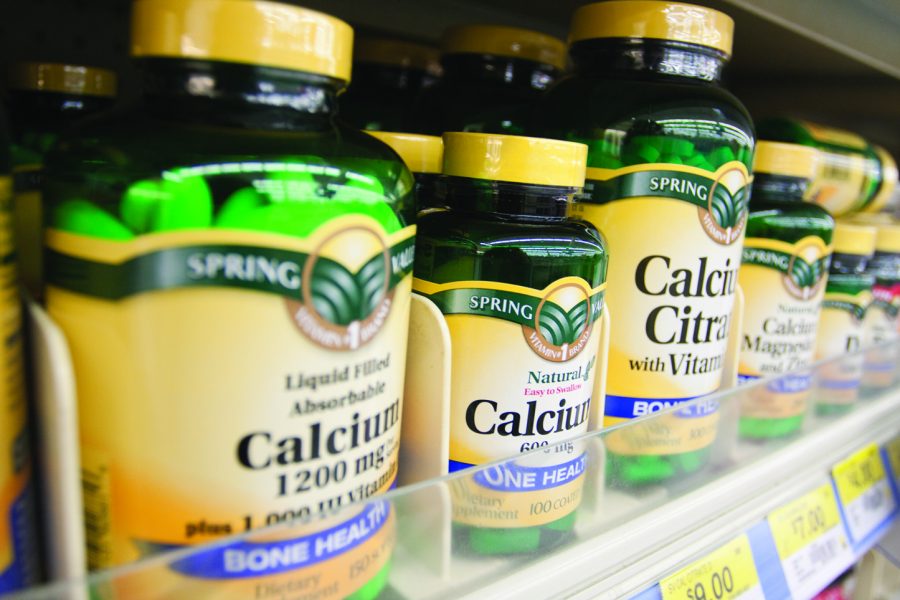Students turn to supplements in winter months
December 2, 2010
<p style=
“margin: 0px; text-align: justify; text-indent: 14.4px; font: 10.5px Times;”>
<p class="MsoNormal" style=
“text-align: justify; text-indent: 14pt;”><span style=
“font-size: 14pt; font-family: Times;”>As the colder months
approach, many people turn to vitamin supplements to aid their
diets.
<p class="MsoNormal" style=
“text-align: justify; text-indent: 14pt;”><span style=
“font-size: 14pt; font-family: Times;”>During the colder season
many people take vitamins to help aid the body in multiple
ways.
<p class="MsoNormal" style=
“text-align: justify; text-indent: 14pt;”><span style=
“font-size: 14pt; font-family: Times;”>UNA junior Amber Petree
takes vitamin supplements to make up for the loss of nutrients she
experiences during the colder season.
<p class="MsoNormal" style=
“text-align: justify; text-indent: 14pt;”><span style=
“font-size: 14pt; font-family: Times;”>“I take Vitamin C during the
winter months to keep my immune system up,” Petree said. “I also
take B-12, so that I am not as groggy because it improves my
ability to stay awake. B-12 helps to keep me more alert and more
focused.”
<p class="MsoNormal" style=
“text-align: justify; text-indent: 14pt;”><span style=
“font-size: 14pt; font-family: Times;”>According to the Mayo
Clinic, Vitamin C can be found naturally in citrus, strawberries,
broccoli, red peppers, tomatoes and kiwi.
<p class="MsoNormal" style=
“text-align: justify; text-indent: 14pt;”><span style=
“font-size: 14pt; font-family: Times;”>The FDA warns consumers to
be careful when consuming Vitamin C, because an excess of the
vitamin can cause abdominal cramps, nausea, diarrhea and insomnia
according to the FDA.
<p class="MsoNormal" style=
“text-align: justify; text-indent: 14pt;”><span style=
“font-size: 14pt; font-family: Times;”>Peggy Bergeron, a nurse at
UNA’s Health and Wellness Center said college students in general
are not eating the way they should.
<p class="MsoNormal" style=
“text-align: justify; text-indent: 14pt;”><span style=
“font-size: 14pt; font-family: Times;”>Bergeron suggested that
students cut processed and fast food out of their diets. “Processed
foods in general are bad,” Bergeron said.
<p class="MsoNormal" style=
“text-align: justify; text-indent: 14pt;”><span style=
“font-size: 14pt; font-family: Times;”>Bergeron said students
forget during the winter months they are losing Vitamin D, which
comes from the sun.
<p class="MsoNormal" style=
“text-align: justify; text-indent: 14pt;”><span style=
“font-size: 14pt; font-family: Times;”> “Get out and walk, get some
exposure to the sun,” Bergeron suggested. “Just get out and walk
around, it helps with mood.”
<p class="MsoNormal" style=
“text-align: justify; text-indent: 14pt;”><span style=
“font-size: 14pt; font-family: Times;”>Bergeron also suggested that
students make sure they maintain a healthy level of Vitamin E in
their diet. She explained that Vitamin E is known to help boost
cardiovascular health and help with keeping the skin from drying
out.
<p class="MsoNormal" style=
“text-align: justify; text-indent: 14pt;”><span style=
“font-size: 14pt; font-family: Times;”>According to the Mayo
Clinic, Vitamin E is found naturally in sunflower seeds, mango,
kiwi, broccoli and spinach.
<p class="MsoNormal" style=
“text-align: justify; text-indent: 14pt;”><span style=
“font-size: 14pt; font-family: Times;”>“Always make sure your
healthcare provider knows which supplements you are taking,”
Bergeron said. “If you are on a prescription medication, make sure
your healthcare provider approves the supplement. Do not just
search the Internet for supplements. Not everything on the Internet
is reputable.”
<p class="MsoNormal" style=
“text-align: justify; text-indent: 14pt;”><span style=
“font-size: 14pt; font-family: Times;”>Human Environmental Sciences
Instructor Jill Englett recommends students eat a healthy diet to
get the essential nutrients the body needs to function.
<p class="MsoNormal" style=
“text-align: justify; text-indent: 14pt;”><span style=
“font-size: 14pt; font-family: Times;”>“Do not take over the
recommended dietary allowance for any vitamin,” Englett said.”The
best way to get your vitamins is through your diet.”
<p class="MsoNormal" style=
“text-align: justify; text-indent: 14pt;”><span style=
“font-size: 14pt; font-family: Times;”>Englett suggests if students
are going to take a multivitamin they should take a multivitamin
that does not exceed 100 % of the recommended dietary allowance set
by the USDA.
<p class="MsoNormal" style=
“text-align: justify; text-indent: 14pt;”><span style=
“font-size: 14pt; font-family: Times;”>Both Englett and Bergeron
warned that if someone is going to take a vitamin supplement, they
should always first advise their healthcare provider.
<p class="MsoNormal" style=
“text-align: justify; text-indent: 14pt;”><span style=
“font-size: 14pt; font-family: Times;”>They both warn that vitamins
in excess can be harmful to the body and counteract with other
medications a person might be taking.
<p class="MsoNormal" style=
“text-align: justify; text-indent: 14pt;”><span style=
“font-size: 14pt; font-family: Times;”>For more information on a
healthy diet, visit mypyramid.gov, visit FDA.gov or visit your
healthcare provider.












